
By Basketbawful and Evil Ted
After enduring several years of constant "Where's KG going to end up?" speculation*, we finally have the definitive answer: The Boston Celtics.
* Sorry, Kobe. But not really.
This is a great move for the Celtics, even if it doesn't take them directly to the Promised Land. For the past five seasons, the team has been a laughingstock, mired in mediocrity (at best) and disgrace (at worst). They haven't appeared on national TV since Zeus knows when -- and rightfully so. Two blockbuster trades later and they're suddenly relevant for the first time since Larry Legend's final season* and a legitimate contender in the East. If Lebron and the Lebronettes were good enough to make it to the Finals last year, why not a potent Garnett / Paul Pierce / Ray Allen combination this year? There's no reason to think they won't do well in a conference where the other contenders -- Chicago, Cleveland, Detroit, Miami, and New Jersey -- pretty much stuck with the status quo**.
* Despite the fact that Larry Bird, Kevin McHale, and Dee Brown missed a combined 114 games, the 1991-92 Celtics still managed to win 51 games and capture the Atlantic Division title. They finished the season on a 15-1 tear -- even winning their final eight games without The Basketball Jesus -- and then went 5-1 in the playoffs before Bird returned from a late-season back injury and screwed up the team's chemistry. The Celtics ended up losing to the Cavaliers in a tough seven-game series that turned irrevocably in Game 4 when a rusty Bird missed not one but two game-winning shots. And thus ended the Bird Era.
** Except Miami, who got significantly worse; their best shooter (Jason Kapono) walked, they lost out on the Mo Williams Sweepstakes, and they and signed Smush Parker, a.k.a. "the worst point guard in the NBA." Pat Riley's failure is now complete.
If you think about it, the trade is nothing short of a miracle, not only because Ainge pulled it off with what he had to offer (the promise of Al Jefferson's future greatness), but also because he managed to hold on to both Pierce and the recently-acquired Allen. It flies in the face of all the "inside the box" thinking he'd become infamous for. All the talk of "potential" and "youth" has been going on too long with the Celtics, and it was way past time to shake things up. So rather than gamble on the Utah Jazz formula for success -- young, hard-nosed, character guys + tenacious defense + two or three plays run to perfection -- he's going the Miami Heat route: A core of hungry, All-Star veterans surrounded by a handful of decent role players. Garnett, Pierce, and Allen all have something to prove*, and here's hoping that together they can prove it. Garnett is the inside presence, Pierce is the slasher, Allen is the shooter...that combination could work out quite nicely. The C's still need some frontcourt depth and a steady point guard, but with a new Big Three in town, they don't necessarily need Tony Parker bringing the ball down court.
* Perhaps the most fascinating subplot in the trade is that Garnett finally gets to prove whether he can win when surrounded by a talented supporting cast. Is he a winner or just a numbers guy? Time to find out.
No, the Celtics won't be deep, but neither were the Celtics of the 80's*. With only five players on a court at once, basketball is a sport where one superstar player can make the difference -- just ask the Heat. No, Garnett, Pierce and Allen aren't Bird, Parish and McHale -- who, as Rick Pitino would point out, still aren't coming through that door -- but I'll be damned if this team won't be a thousand times more exciting to watch than they have been since, well, forever. No, the window isn't huge -- 3 or 4 years, tops -- but better a small window than the brick wall the Celtics have been banging their heads into since, well, forever.
* As noted, the 1986-87 Celtics quite possibly had the worst bench of all time. The 1987-88 Celtics weren't much better off. Go back and watch Game 7 of the 1988 Eastern Conference Semifinals, also known as Larry's duel with Dominque. Coach K.C. Jones was forced to play a group of white stiffs comprised of Brad Lohaus, Fred Roberts, Jim Paxson, and Mark Acres. Their best reserve, Reggie Lewis, was a rookie and played only three minutes. Ugly.
Maybe Danny isn't a genius. Maybe he's just taking advantage of his relationship to Kevin McHale. But I don't particularly care how he did it, just like I don't particularly care who Red Auerbach beat up in a dark alley when he traded for McHale and Parish*. Let the next chapter for the Celtics begin.
* Sorry, Joe Barry Carroll. But not really.
Labels: blockbuster trades, Boston Celtics, Danny Ainge, Kevin Garnett, Kevin McHale, Larry Bird, Paul Pierce, Ray Allen, Robert Parish
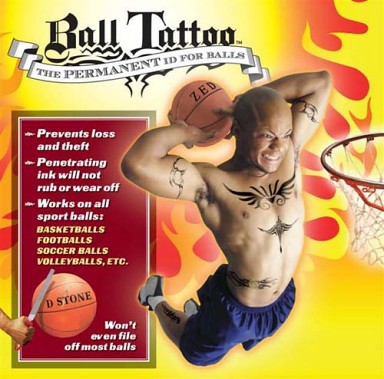
What it is: A stencil and ink set.
What it's supposed to do: Allow you to stencil your name, initials, or some other identifying label on your basketball in permenant ink.
What it actually does: The Ball Tattoo works exactly as advertised. It goes on in a couple of minutes and the resulting "tattoo" looks pretty stylish. It resists fading, too; I've been using the Ball Tattoo for about six months and there has been little or no visible change. Supposedly, you can't even file the ink off, although it's probably better not to try.
Who it's for: Anybody who's paid good money for their basketball and wants to keep track of it. Sure, you could just write your name onto the ball with a felt-tip marker, but it'll look only as good as your crappy handwriting, and then it'll wear off in a couple weeks.
What it says about you: You understand that there are unscrupulous and clueless people everywhere, and discovering that somebody walked off with your $50 basketball while you were in a game is a bitter pill to swallow.
The specifications: Each Ball Tattoo kit contains one sheet of 45 one-inch tall stencil letters, masking strips, a tube of ink, and an applicator brush. The seller claims there's "enough ink to ID up to three balls," which might be a little deceptive. There's actually about 20 letters worth of ink in the tube, so choose your ball ID carefully, Amadeaus. The ink works on rubber, leather, and synthetic balls. Currently, only one font (Lasertac) and color (black) are available.
Cost and availability: $6.95 (plus S&H) at Fastencil.com.
A note of caution: One of the product's taglines is "Looks like silk screen. Works like Kryptonite!" I'm not exactly sure what that's supposed to mean, except that if Superman plays in your pickup league you might accidentally kill him.
Update: Reader eljpeman astutely pointed out that the subtitle on the graphic reads "The permanent ID for balls." For those of you with dirty minds, I'm pretty sure they're talking about basketballs and not, uhm, well, yeah.
Labels: gear, pickup basketball
Usage example: When a mysterious call is made during an important playoff game, you've probably just witnessed the Stern Button in action.
Word History: The Basketbawful gang invented this word while watching Game 6 of the 2002 Western Conference Finals (see below). Some of the calls in that game were so unbelievably bad, we theorized that David Stern -- who was sitting in the crowd -- was using one of those gameshow hand buzzers to force the officials to favor the Lakers. Ever since then, all subsequent examples of dubious officiating have been blamed on the Stern Button.
We like to imagine that, when Stern uses the button, he looks just like Emperor Palpatine did in Star Wars: Episode III when he told his clone troops to execute Order 66. So next time you realize the fix is in, turn to a buddy, pantomime thumbing the Stern Button, and recite the line in a croaky voice. This is even more effective if you replace the number 66 with the number of the corresponding NBA player. For example, assume that you're watching a Bulls playoff game from the mid-90s on ESPN Classic and Jordan is getting preferential treatment from the officials. In this case, you would pretend to depress a button and say, "The time has come. Execute Order 23." Maybe I'm just easily amused, but I never get tired of doing this.
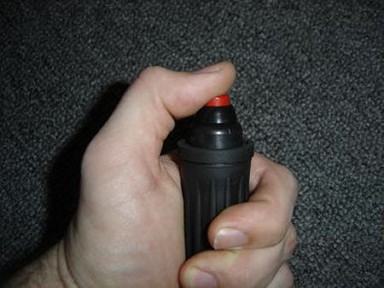
UPDATED: The Top 6 Stern Buttom Moments
1. Game 6 of the 1988 NBA Finals. The stakes: The Lakers were trying to become the first NBA champion to repeat since Bill Russell's Celtics did it in 1969. However, the Pistons were leading the series 3-2 and, thanks largely to Isiah Thomas' 25 third quarter points, they were ahead 102-101 with 14 seconds left. However, Bill Laimbeer got whistled for a cheap bump foul on a Kareem Abdul-Jabbar skyhook. Kareem, channelling his inner Rick Barry, hit both freethrows to give the Lakers the victory. L.A. went on to win the title, and get their repeat, in Game 7.
2. Game 6 of the 1991 Eastern Conference Semifinals. The stakes: A Pistons/Bulls matchup in the Eastern Conference Finals. The Pistons won back-to-back titles in 1989 and 1990, tormenting Michael Jordan along the way, and 1991 was supposed to be Jordan's payback year. However, the Pistons had to get past the Boston Celtics first. The C's were leading by two points in the final minute of regulation, and it looked like they were going to take the series back to Boston Garden for a deciding Game 7 when Kevin McHale cleanly blocked a Joe Dumars layup. However, Referee Jack Madden inexplicably whistled McHale for goaltending. That call tied the game, and the Pistons would go on to win it in overtime, "earning" the chance to get swept by the Bulls, who were en route to their first appearance in the NBA Finals.
3. Game 7 of the 1993 Western Conference Finals. The stakes: An NBA Finals showdown between the two best teams (Bulls and Suns) and the two best players (Michael Jordan and Charles Barkley) in the league. Clearly the Seattle Supersonics had no chance, especially since the Suns were gifted with an NBA playoff record 64 freethrow attempts.
4. Game 6 of the 1998 NBA Finals. A (second) fairytale ending for Michael Jordan's career. The whole series was kind of a sham, actually. Karl Malone was the reigning MVP, but the officials were allowing Dennis Rodman to hold him, trip him, armlock him, and, in a couple cases, out-and-out wrestle him to the ground. Despite the egregious amount of hand-to-hand combat being leveled against the Mailman, he averaged only six freethrow attempts per game (as opposed to 10.5 during the regular season). Just go back and watch those games, then try to tell me he only deserved three trips to the line per game. Jordan, on the other hand, who averaged eight FTAs during the regular season, got 12 FTAs per game during the Finals. But the worst of the worst happened in Game 6. First, the officials allowed a Ron Harper three-pointer at the end of the second quarter despite the fact that replays showed it came after the buzzer. They then disallowed a Howard Eisley three at the end of the third that replays showed clearly came before the buzzer. That's a six-point swing in a game that was decided by a single point after Jordan pushed off on Bryon Russell to hit the game-winner.
5. Game 6 of the 2002 Western Conference Finals: The stakes: A ratings-busting Game 7, another trip to the NBA Finals for the media darling Lakers, and the potential for the first threepeat since Jordan's second retirement. Despite it all, the Sacramento Kings were on the verge of knocking off Shaq and the Lakers, until the officiating went haywire. The Lakers players were given a five-foot cushion by the refs, who granted the Blue and Gold 27 freethrows in the fourth quarter. At one point, Mike Bibby actually leaped out of Kobe Bryant's way and still got whistled for a foul. The Lakers went on to win 106-102.
6. Games 3, 5, and 6 of the 2006 NBA Finals: The Stakes: An NBA championship for fan favorites Dwyane Wade and Shaq. Wade was awarded 18, 25, and 21 freethrow attempts in three crucial victories for the Miami Heat. In those three games, the Heat defeated the Dallas Mavericks by margins of two points, one point, and three points. It's pretty clear that Wade's 64 FT attempts in those games were kind of important.
Labels: Boston Celtics, Chicago Bulls, Dallas Mavericks, Detroit Pistons, Los Angeles Lakers, Miami Heat, Phoenix Suns, Sacramento Kings, Seattle Supersonics, Word of the Day
So I am here to present the Flip Side... and perhaps in the process make Basketbawful feel a little better about the state of our world.
To some, my "Flip Side" point of view is a tad off (specifically, see my borderline psychotic "Flip Side of being Tony Parker" rant in June - I think I was on mushrooms at the time). But some, if they look deep enough, will realize that I speak the pure, unfiltered truth. Let's begin:
Good Thing 1: This scandal is good for the NBA
Huh? What did he say? Is this guy nuts???
Look, I, Evil Ted, don't have the pressure of churning out daily material on this subject, so rather than first asserting that "This will be terrible for the league for years to come," and then slowly working my way over time into "Well, I guess it wasn't so bad for the league" and finally admitting a year from now that "Huh, maybe it was actually good for the league," I can just come out and say now that it will be good for the league.
Why?
It will be tougher for future officials to pull this kind of crap, because the league will learn where and how Donaghy slipped through the cracks, and better prevent future problems. Are there guarantees? No, there are no guarantees of anything, anywhere. There are only levels of awareness, and the NBA Gambling Threat Level has gone from blue to orange. I don't know exactly what orange means, but let me assure you it means there are K-9 units, FBI agents, and slam-dunking mascots scrambling around the globe.
Good Thing 2: David Stern Actually Appears to have a Clue
I listened to and read David Stern's press conference from beginning to end, fully prepared to hate everything he had to say and think he was an ignoramus. Yet, miraculously, he somewhat impressed me. Oh sure, his drab monotone and hangdog demeanor were thoroughly uninspiring, and I still despise his lottery system, but damn if he didn't say all the right things (most of the time):
Excerpts from Stern's Press Conference:
"...We educate our referees intensely. We have training camp presentations, we have brochures..."
Oh, you have brochures, David? Nobody's ever ignored a brochure. This was the weakest point, but was followed by Stern discussing the security precautions, former FBI agent led police teams, and background checks that have been going on with officials for some time. Good, good, and good.
"...In addition to [background and security checks / FBI led security teams]...we have for many years retained a consultant in Las Vegas whose job it is to inform us ...[of]...unusual movements in betting on the NBA... we're also in contact with the Nevada Gaming Board who monitors...anything that we should be concerned about...."
Getting all Ocean's Thirteen on my ass, David? Impressive. Color me impressed. And the Vegas odds that I was going to be impressed? 72 to 1. Ok, that's all good, David, but what about the bad calls that have been going on throughout the league. Have you been doing anything about that? Hmmm? Have ya?
"...Since the beginning of 2003-2004, [we have] been implementing a system that is designed to capture every call that a referee makes, and every non call that is deemed by observers to be incorrect...We have retained 30 observers, one at each of our team's games. They are in effect charting the game with respect to the calls and other observations that they make. They then review the game on tape. They then are audited, not every game, but selectively audited by the group supervisors that we have employed by the NBA."
Independent auditors checking the calls AND non-calls? Now you're getting my attention. Apparently, you do have a clue ... and here I was thinking you a complete moron. Color me still impressed. Next you're going to tell me you audit the auditors.
"And then most recently this year, we actually...do an audit on the auditors and satisfy ourselves [of] accuracy..."
GET THE FUCK OUT! This may the most soundly conceived "Cover your ass" policy ever. Why isn't this guy running homeland security? Even if you hate him, you have to admit, Stern appears to have covered his bases here. As much as I wanted to rip into Stern, I rarely found the chance. I was waiting for him to make some revelation, to admit to some bad judgment on his part that would eventually be revealed, and yet there seemed to be nothing. Now, I'm not about to get all lovey-dovey here. This was still a one-sided, heavily prepared, orchestrated press conference, but still, there were no glaring issues to have with Stern here.
And further, Stern and the league seemed to handle things well when Donaghy had a legal dispute with his neighbor in Pennsylvania. Based solely on the fact that Donaghy had an "ongoing legal dispute with his neighbors," (gambling at that point was alleged but unproven and therefore not at issue), Stern indicated that the legal trouble was "not the kind of conduct that we expected from our referees" and proceeded to pull him from working the second round of the playoffs in 2005. Strict disciplinarians might think this lame, but cynics, like myself, would have expected the NBA to sweep situations like that under the rug without a thought. They didn't.
OK, enough David Stern love. The full conference is at the link above. I suggest everyone give it a listen.
Good Thing 3: It's not a Conspiracy
By all indications thus far, this was one man doing stupid illegal things. If it proves out that this involved multiple people at different levels of the NBA, then you've got a REAL problem, and only then can we start talking about "the future of the League." Right now, the league is just fine. All Donaghy has proven is something we already knew; no matter how much security, background checking, and policing you do, you can never guarantee that a bad apple won't get into your organization.
Good Thing 4: When you think about it, it's kinda funny
As I stated in a past post, a dirty ref fit right in with the clean ones for two years. You could cut the irony with a knife. Let's forget about Donaghy - the courts and the Mob will handle his sorry ass...it's time to figure out why the other refs stink so bad...
At the very least, this scandal has forced Stern to discuss an audit system I never knew existed. It means he's paying attention, and it's almost as good as an outright admission from Stern that he realizes there's an officiating problem - Halleluia! Of course, this works out brilliantly for Stern - now he can blame bad officiating on his auditors.
And speaking of scapegoats...
Good Thing 5: The NBA gets its scapegoat
Now all the bad officiating of the past gets a face: Tim Donaghy. The NBA isn't tainted for 2008. On the contrary, it gets a fresh, clean slate. It has purged a cancer, and has a chance to make the Donaghy disaster the impetus for a better officiated league (a worse officiated league seems, frankly, inconceivable).
Good thing 6: People have short memories
I don't remember what I ate for breakfast. By the beginning of next season, the Donaghy situation will be worth a Charles Barkley two-minute rant, and we'll move on and enjoy watching basketball like we have forever.
Good Thing 7: A new Basketbawful term
Once Basketbawful manages to lift out of his doldrums, I suspect one of his first "Word of the Day" entries will be "Pulling a Donaghy" - a synonym for officiating so bad that it smells crooked. In the slammer, of course, "Pulling a Donaghy" will have an entirely different, disturbingly obscene meaning. Leave the soap on the prison house floor, Tim - I wouldn't be surprised if a former NBA player or two is rotting in the same big house, just waiting to reciprocate on a "flagrant foul" call you made in 2004.
Good Thing 8: Football season is coming
And Basketbawful's beloved Colts will be looking to defend their title. Just to make him feel better, I won't even mention of my Pats and their nicely revamped receiving corps.
Oops, just did.
Labels: David Stern, Tim Donaghy
Well, not this time. The Donaghy scandal makes me feel like a kid who woke up to a lump of poop in his stocking on Christmas morning, then found out the Easter Bunny skinned Santa Claus and ate him alive. In other words: Not happy.
Fortunately, you can find full coverage of the sordid affair at Henry Abbot's TrueHoop blog. Yesterday, Henry published a post called Is the League in Jeopardy, which includes the opinions of a wide variety of NBA experts (ourselves included). If you haven't read it yet, go read it now.
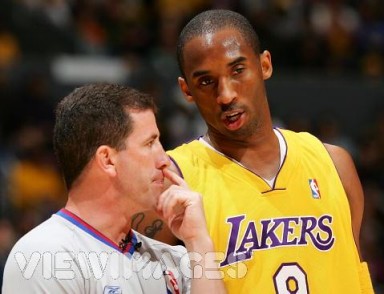
Labels: scandals, Tim Donaghy, TrueHoop

File this one under the category of totally random NBA-related discoveries: Lebron's Lightning Lemonade. It's a flavor of Bubblicious bubble gum that (supposedly) tastes like rasberry lemonade. Each bright pink cube provides a burst of tongue-numbing flavorocity that lasts for almost a full minute, which might actually be some kind of bubble gum world's record. Unfortunately, like most chewing gums, Lebron's Lightning Lemonade degrades into a foul-tasting paste by the second or third minute of vigorous chewing. Still, I can guarantee you'll experience upwards of 30 to 45 seconds of tastebud-blasting ecstacy. But don't take my word for it -- just look at how happy it makes King James:
If you think that the fun ends when you finally spit out the now-viscous and gummy pulp, you couldn't be more wrong. By sending Bubblicious a completed request form, two proofs of purchase, and a $1 check or money order, you can (eventually) download a copy of Lebron James Voice-Activated Software. The LJVAS is a desktop widget that makes a Lebon "the point guard on your computer." And trust me, it's not nearly as exciting as it sounds.
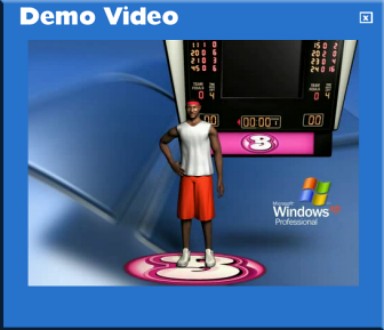
By using Windows' voice-activation software, you can teach Computer Lebron to recognize your voice and respond to some simple verbal commands, like "open my email" or "take me to my favorite Web site." And like any good robotic servant, Computer King James will leap to action, opening and closing programs for you. As Jim Hanas put it, it's the NBA-equivalent of Clippy.
Software requirements: It's a widget that opens and closes basic computer programs. As long as you aren't using an abacus, you'll probably be okay.
Tips and tricks: In most cases, Lebron won't come out from wherever he's hiding unless you call for him -- I suggest teaching him to respond to the command "Lebron, get your kingly ass out here, now." But once a month for six whole months, Lebron will randomly wander onto your desktop to give you a basketball tip. I don't know what these tips are, but I'd guess he provides helpful advice like "Put your head down and charge aimlessly into a group of defenders" and "vary your form on every jumpshot...never shoot the same way twice."
Usefulness: At this point you're probably wondering whether getting the LBVAS is worth buying two packs of gum, filling out a form, writing a check, and stuffing an envelope. The answer to this question depends on your living situation. If you're a Lebron fanatic without arms or an active sense of shame, this minor software miracle might be for you. Otherwise, your computing experience will be just as rich, if not moreso, without Lebron's "help."
Labels: Bubblicious, computer software, Lebron James, product review
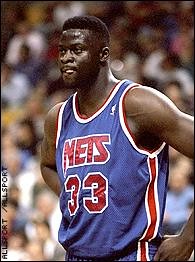 The NBA is shockingly full of bad passing and ball-hoggery; we hold this truth to be self-evident. But can you imagine somebody playing 1,002 minutes in 110 games over a four-year career and dishing out only four assists? Well, believe it or not -- and if you read this site you probably do -- it happened. The culprit was the "Nigerian giant" Yinka Dare, possibly the worst passer in league history.
The NBA is shockingly full of bad passing and ball-hoggery; we hold this truth to be self-evident. But can you imagine somebody playing 1,002 minutes in 110 games over a four-year career and dishing out only four assists? Well, believe it or not -- and if you read this site you probably do -- it happened. The culprit was the "Nigerian giant" Yinka Dare, possibly the worst passer in league history.After the New Jersey Nets selected him 14th overall in the 1994 NBA draft, Dare had some strong words for anybody and everybody who would listen:
"When I see myself play, I think of Hakeem Olajuwon, Patrick Ewing, Shaquille O'Neal. For instance, Shaq is explosive around the basket, and I am, too. If I play my best, I'll be better than some of the best big men who ever played. I'm going to be an All-Star. The teams that didn't draft me made a mistake."
As it turned out, those teams knew exactly what they were doing. Dare wasn't even good enough to get dunked on in one of Shaq's posters. His career averages of 2.1 PPG (on 39 percent shooting) and 2.6 RPG are proof of that. He even had a negative PER during his rookie season, a fact that probably caused John Hollinger to throw up in his Wheaties. But those dubious achievements are nothing compared to Yinka's greatest legacy: 77 games and 770 minutes played without a single assist -- an all-time NBA record for passing futility.
Dare didn't dish his first assist until midway through his third season. Although, to be fair, he got injured three minutes into his very first game and missed the rest of the year. But he played 58 games (and 626 minutes) in his sophomore season without registering an assist. He did, however, commit 72 turnovers and earn the nickname "Stinka Dare" from teammate Kenny Anderson. A sports writer also commented that "Dare" was Nigerian for "comes to NBA without game."
The 1996-97 campaign was Dare's greatest passing season: three assists in 41 games and only 21 turnovers. Unfortunately, the good times were over; Dare would play only 10 games -- dishing one assist -- in his next and final season. Dare finished his NBA career with 4 assists and 96 turnovers, for a miraculous 16:1 turnover-to-assist ratio. According to his bio on NBA.com, Dare's career assist average is 0.0.
Sadly, Dare died of a heart attack in 2004 at the age of 32. Ironically, his last act on this earth was to "pass away."
Update: Thanks to josh for providing me with a link to this Yinka Dare Tribute Site. There learn fun Yinka Facts, like how he invented water and won the 1996 Mr. Universe contest.
Labels: assists, New Jersey Nets, passing, Yinka Dare
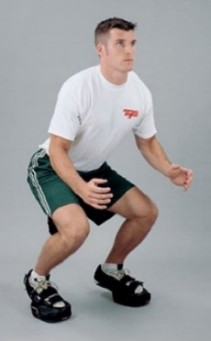 What it is: Plastic platforms that attach to the front of your shoes, forcing you to walk in a painful, duck-like manner, similar to the kind of torture that the Nazis inflicted on their cyborg gorilla shock troopers (see illustration).
What it is: Plastic platforms that attach to the front of your shoes, forcing you to walk in a painful, duck-like manner, similar to the kind of torture that the Nazis inflicted on their cyborg gorilla shock troopers (see illustration).What it's supposed to do: Increase your vertical leap by 5 to 10 inches, take two-tenths of a second off your 40-yard dash time, and increase anaerobic power by 500 percent.
What it actually does: (You mean, assuming they don't get tossed in the closet and forgotten after two or three uses, like 99 percent of the jumpsoles that have been sold?) Creates huge, throbbing calf muscles -- think Popeye's forearms, only on your legs -- and inspires delusions of leaping grandeur that will never, ever, under any circumstances, come true.
Who it's for: Basketball players who can't jump over a nickle or outrun their aging grandmother (who, for the record, has had both hips and one knee replaced), but nonetheless dream of streaking downcourt like a bolt from the blue and soaring through the air for a monster jam over the awestruck pickup leaguers. This is, of course, a colorful euphemism for "white guys."
What it says about you: You can't accept the cold and pitiless truth: That you will never dunk, except maybe on those 8-foot plastic rims they have over at the local elementary school.
Fact versus fiction: You've heard the stories before: "Just before his 6th birthday, little Timmy was doing awesome tomahawk crams, two-handed dunks, reverse james, windmill slams, you name it -- and he's only two feet tall!!" These are the kinds of amazing claims you'll read anywhere and everywhere jumpsoles are sold. One of the testimonials, and my personal favorite I might add, was titled "wooo look at the white boy fly," and it was the touching saga of how a brave Caucasian youth turned the tables on fate to become a bounding wonder with the help of his trusty jumpsoles.
While these stories are compelling, jumpsoles "increase" your vertical leap in the same way that Chocolate Frosted Sugar Bombs are a "part" of your balanced breakfast. Expanding the distance between the court and your giant, clunking feet requires a well-rounded program of strength training, core work, and plyometric excercises, not to mention a natural genetic predisposition toward jumping.
Can the jumpsoles and all those other things help you jump a couple extra inches? Maybe. Just don't expect to add an extra foot to your vertical. If that was actually possible, don't you think that every NBA player would be jumping like Mike?
Cost and availability: $69.95 (plus S&H) at JumpUSA.com. If you're ready to drop an extra $20, you can also get the Proprioceptor System, which is a little ball you screw on to the bottom of your jumpsoles. This adds a higher degree of difficulty and instability to your embarrassing duck walk, but it's supposed to improve balance, reduce the risk of ankle and knee injuries, and make you look like a bigger idiot. But isn't the chance to become a jumping god worth the risk of a little humiliation?
Labels: gear, pickup basketball
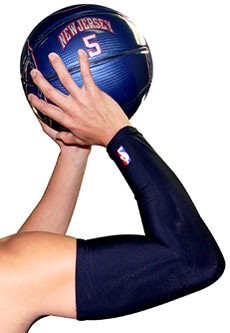 What it is: A form-fitting sleeve, typically made from a synthetic blend of nylon and spandex, that's worn over the forearm and bicep or your shooting arm.
What it is: A form-fitting sleeve, typically made from a synthetic blend of nylon and spandex, that's worn over the forearm and bicep or your shooting arm.What it's supposed to do: Keep the shooting arm warm, prevent muscles from cramping or overstretching, and help you maintain proper shooting form.
What it actually does: Looks cool. Makes your arm sweaty.
What it says about you: The shooting sleeve was first popularized by Allen Iverson and has been worn by other fan-favorites such as Dwyane Wade and Carmelo Anthony. Yes, those guys are All-Stars, but don't be fooled; this is not a performance-enhancing device. NBA players may claim that the sleeve provides some kind of superficial assistance to their play, but we all know it's more of a fashion statement than anything else, like cornrows, tattoos, and Kobe Bryant's Peter Pan-style tights.
If you currenty wear or have worn a shooting sleeve, you're probably the kind of person who wants to artificially improve your performance without actually practicing. Furthermore, you want other players to know, simply by seeing your pimped-out appearance, that you are a serious baller. This is just a guess, but you probably also pay way too much for shoes (I'm talking easily $100+ per pair), wear throwback jerseys to your pickup league, and maybe even own an official pair of NBA socks (making sure the logo is prominently displayed during games). In short, you take pickup basketball, and yourself, a little -- scratch that, a lot -- too seriously.
Cost and availability: $14.99 (plus S&H) at the NBA online store.
Labels: gear, pickup basketball
For two years - perhaps more - you've been betting on games. You've lost money, and gotten yourself into trouble with your bookie and the mob. You've bet on games you officiated. And you've altered the outcomes of said games.*
*Since an indictment has not yet been made, I will ask readers to insert the word "allegedly" in every assertion made above.
For quite some time, we at Basketbawful have bemoaned the inconsistent - and sometimes absurd - officiating of NBA games. It has actually made it more difficult, over time, to watch this sport we love so dearly. We've joked, we've needled, we've made assertions that somebody is "on the take." And yet despite our most acrimonious accusations, in the back of our minds we always thought these officiating mishaps were honest, albeit incompetant, mistakes. There was that notion - naive perhaps - that the league, while grossly imperfect, was clean.
And now here comes Tim Donaghy, galloping in on a white horse to justify all of those assertions we made.
Thank you, Tim Donaghy.
Thank you for making us seem so smart.
The Repercussions
I do not feel, like the rest of the world, that this will destroy the league for years to come. In fact, I don't even think it will alter the perception of the league for very long at all. If anything, the black eye Donaghy has created will - let's hope - cause the league be more diligent in its oversight of officials, now that there is tangible proof that such crookedness can, and does, exist. It will be more difficult for other refs do something like Donaghy has done, now that a spotlight has been put on it.
People have short memories, NBA fans will love the sport regardless of this development, and they are too savvy to attach the behavior of one man to an entire group of unmotivated, middle aged, legally blind men. Donaghy is now a punch line of jokes and a tag line for NBA haters, but his behavior won't make one iota's worth of difference whether Joe Paycheck or John Rockerfeller are going to buy season tickets for their favorite team. If attendance is down next year, it will not be because Tim Donaghy is an idiot - but to attract eyeballs and fill newspaper columns, analysts will undoubtedly argue this notion.
That said, let's give some highly sarcastic props to a league where a dirty official, betting on his own games and altering their outcomes, WASN'T CAUGHT FOR YEARS. What does this say about the officiating in this league? It says that a man actually attempting to fix games fit right in with a league full of bumbling zebras who mess up althletic contests regularly without one bit of involvement by bookies or the Mob.
If that doesn't scream for the league to reevaluate the competance and methods of its officials, I don't know what does.
Labels: Tim Donaghy
You know, a lot of people have forgotten -- or maybe never really knew -- just how good Larry Bird was back in the day. I think these same people assume that Bird, while generally a better rebounder and passer, couldn't keep up with Jordan in the scoring department. Wrong. Unlike Jordan, Bird didn't care about winning the scoring title. And, with teamates like Kevin McHale and Robert Parish, he didn't have to.
Make no mistake, though: Bird could put the ball in the hoop. Casual fans only remember the Larry Bird of the early 90s. By that time, his back was injured so badly he was practically a cripple (and, indeed, he spent time in traction between games during the 1991 playoffs). Of course, he still averaged 20/9/7 a game during his final two seasons, which is pretty impressive considering that -- as M.L. Carr put it in Unfinished Business -- he was playing without a back.
But it's interesting to look back at the Bird/Jordan duels of the 1986-87 and 1987-88 campaigns. Those were Bird's last two healthy years, and they were also the seasons that Jordan was at his most statistically dominant (37/5/4 in '87 and 35/5/5 in '88).
In 1986-87, Bird averaged 34 PPG (on 56 percent shooting) against the Bulls; Jordan averaged 29 PPG (on 42 percent shooting) against the Celtics. Bird outscored Jordan in four out of six games, and two of those times it wasn't even close: On March 27, 1987 Bird hit for 41 (17-29) compared to Jordan's 22 (9-23); on April 17, 1987 Bird netted 38 (17-29 again) and Jordan had only 17 (5-15).
In 1987-88, Bird averaged 34 PPG (on 59 percent shooting) against the Bulls (although he missed two of the games due to injury), while Jordan scorched the Celtics for 39 PPG (on 55 percent shooting), including one 50-point outburst. Bird outscored Jordan twice in the games they played against each other: 33 (14-21) to 26 (10-18) and 44 to 39 (as noted above). They had another great shootout on January 12, 1988: Jordan won the scoring war 42 (19-35) to 38 (18-31), but the Celtics won the game 104-97, despite the fact that they had to start Dirk Minniefield (who??) in place of the injured Dennis Johnson.
The point (no pun intended) of all this should be clear: When healthy, Bird could score with Jordan whenever he was inclined to do so. While many people just matter-of-factly declare Jordan as the GOAT, everyone should be aware that Larry Bird, healthy and in his prime, was as good as Jordan...even better in some areas (such as rebounding and passing). Although, admittedly, he was never as good of an individual defender as Jordan, but he wasn't quite as bad as everyone seems to think (again, most fans only remember the nearly immobile Bird from the end of his career).
For the record: The Celtics were 6-0 against the Bulls in 1986-87, and they were 3-3 against them in 1987-88. Of course, Bird missed two of the games in 87-88 (and Kevin McHale also missed one of those games); the C's were 3-1 with Bird in the lineup and 0-2 without him. Jordan finished second (to Magic Johnson) in MVP voting in 1987, while Bird finished third. Jordan won it (somewhat dubiously) in 1988, and Bird finished second.
Labels: classic duels, Larry Bird Michael Jordan, scoring
*And if you've seen his GQ-style pictures on NBA.com, you'll know that's saying something.
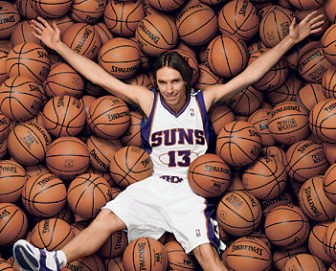
Add to the odd nature of this picture the fact that the final version reads -- in big, bold, yellow letters -- "Fill It Up" and you have the perfect cover for a sports-themed gay porn video.
Labels: balls, pictures, Steve Nash
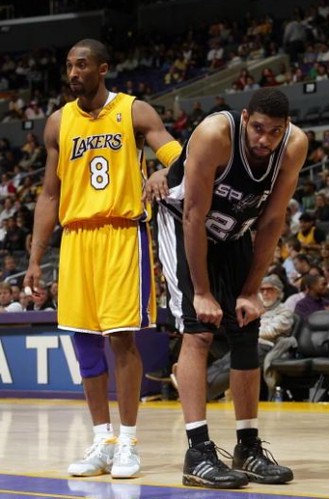
I've been sitting on this one for a while. It's from the 10 Sense with...Tim Duncan interview that appeared in the February issue of Dime Magazine. Duncan was asked which starting five, out of anybody in the NBA, he'd choose to go to war with. His answer is pretty interesting:
"My ideal starting five? Honestly, the five that Adidas put together, you can't argue with that at all. KG, T-Mac, Gilbert, Chauncy and myself. You can't argue with that five compared to anyone else. As a sixth man, I might add Kobe. Or, shit, even put Manu in there with us."
Now, Tim Duncan is the greatest winner of the last decade and the co-most dominant player alongside Shaq (although it could be argued that Shaq hasn't been truly dominant since 2004-05). And it's not just the winning, but how he's won: Four titles in nine years, while his team has changed drastically around him. The fact is, he plays "team basketball" better than probably anyone in the league (which I think is why he's so dominant without really looking dominant).
And he wouldn't want Kobe Bryant, the so-called "best player" in the league, in his starting five.
I don't know. Maybe it's not that big of an insult. After all, he left out a lot of other really good players, guys like Steve Nash, Dirk Nowitzki, Lebron James, Dwyane Wade, Shaq, etc. And he was also plugging for Adidas, the company that pays him a lot of money to endorse their products.
But the fact that he relegated Kobe to the sixth man role, then casually replaced him with Manu Ginobili was like a backhanded insult. I mean, think about it: "I don't want you starting, but you can be sixth man. Oh, wait, no you can't...I'll take this other guy instead." Why would Tim say that? Well, maybe it has to do with one of his follow-up statements:
"I'd say 60-70 percent don't 'get it' -- players who play for the wrong reasons or teams playing the wrong way. It's those few teams that 'get it' that elevate themselves."
Maybe that's it. Maybe he, like many other people, thinks Kobe just doesn't "get it." Whatever the reason, I still got a good laugh out of it. Thanks, Tim.
Labels: Kobe Bryant, Tim Duncan
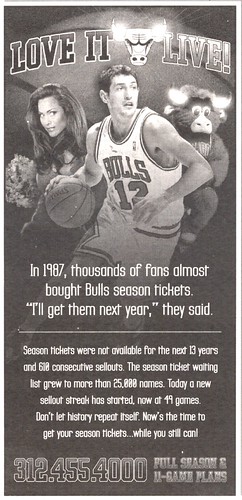
I love the blatant fear mongering: If you don't buy season tickets right now, they could be sold out for 13 years...it happened before. And while that statement is true, technically speaking, the "before" team featured Michael Jordan. And unless I passed out and missed something big, the Bulls didn't sign Jordan in the offseason. They signed Joe Smith. I don't see Smith -- who averaged a whopping 8 PPG and 6 RPG last season -- tipping the balance of power in the Eastern Conference. But then again, the East is so crappy I guess it's not entirely out of the question. Next June, I might be forced to admit that the Bulls had been only one Joe Smith away from reaching the NBA Finals. But I doubt it.
I just sort of think the scare tactics are a little much. A team should be sold on its merits, not the fear of maybe, possibly, conceivably missing out on legendary run, especially when there's no real evidence to suggest that's going to happen any time soon. If the Bulls had won the draft lottery and snagged Greg Oden or Kevin Durant, I could see the value of a "don't miss out" marketing campaign. As things stand, I think the Bulls should be marketed for what they are: A group of young, exciting, up-and-coming players who play hard every night.
Fat chance of that, though. None of the current roster are even mentioned as attractions on the team's official season ticket page. However, the page does try to entice you with the chance to see "LeBron, D-Wade, Shaq, Kobe, Garnett, McGrady, Duncan and the rest of the NBA's elite." That can't make guys like Ben Gordon, Kirk Hinrich, or Luol Deng feel very good about themselves.
Oh well. That's marketing for you. It is what it is. And besides, it doesn't really matter to fans like me. I've been attending Bulls games since they were rocking a lineup that featured Dickey Simpkins, Mark Bryant, Randy Brown, and Rusty LaRue. And as long as they keep Luvabulls like Carissa around, I will keep on loving it live.
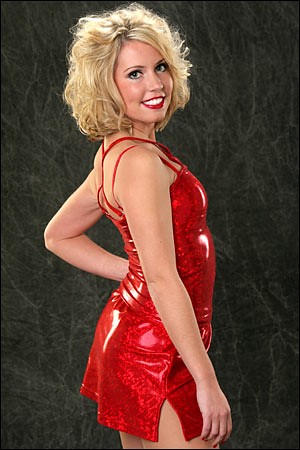
Labels: Chicago Bulls, Joe Smith, NBA marketing
* Kareem received both MVP and All-Defensive First Team honors during the 1979-80 season. He averaged 3.4 BPG.
[Thanks for the reminder, Josh.]
Labels: circus shots, Dr. J, Kareem Abdul-Jabbar
So why did Nuggets finish with a pathetic 20-62 record and waaaaaaay out of the playoffs? Because they were the worst defensive team of all time. Seriously.
Just how bad were they? They gave up 130.8 PPG. You read that right: Per game. Just think about that for a minute. Can you imagine putting up almost 120 points every night and still losing by an average of 11 a game? By the way, that 130.8 PPG is, indeed, the most allowed by any team in NBA history. And while it's true that team scoring averages were higher in '91 than they are today -- the league average was 106.3 PPG -- the Nuggets still allowed 24.5 PPG more than the league average. That means they could add Dirk Nowitzki's 2006-07 scoring average and still barely break even.
But wait! There's more. As a team, they shot 44.0 percent from the field -- worst in the league that season -- while allowing their opponents to shoot 51.2 percent, another league-worst. What's even more absurd is that they never, not once, held an opponent under 100 points. In fact, they held an opponent under 110 points only four times. By comparison, they allowed nine teams to score more than 150 points against them. Here's a breakdown of the number of points allowed by the Nuggets over the course of the 1990-91 season:
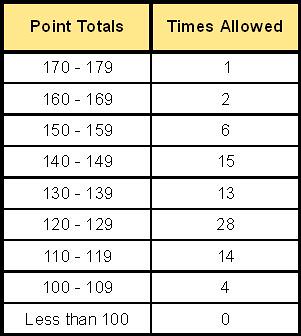
The coach of the team was Paul Westhead, best known for getting run out of Los Angeles by Magic Johnson. He decided before the season to implement an up-tempo offense that emphasized pushing the ball at every opportunity. Unfortunately for the '91 Nuggets, Lawler's Law -- which states that the first team to 100 points usually wins -- only works when you can actually stop the other team a couple times.
Runner Up: Strangely enough, the second-worst defensive team of all time was the 1981-82 Denver Nuggets, who surrendered 126 PPG while allowing opponents to shoot 52.4 percent. Coach Doug Moe used a motion offense he called "playground ball with a little supervision." Apparently there there was even less supervision on the defensive end. On the upside, they were the highest scoring team in league history at 126.5 PPG. Which got them into the playoffs, where they were gave up 121 PPG and were promptly knocked out in the first round by the Phoenix Suns.
Bonus Trivia: The 1982-83 Denver Nuggets have the dubious distinction of being the only team to ever score 184 points in a game...and lose. On December 13, 1983, the Nuggets lost to the Detroit Pistons by the score of 186-184 in triple overtime. And for the record, that Nuggets team gave up 122.6 points per game, which is good for 5th worst all time. Of course, the 1983-84 Denver Nuggets were the 4th worst defensive team ever, allowing 124.8 points per game. In fact, the Ultimate Stat Search at databaseBasketball.com reveals that five of the top ten worst defensive teams of all time are former Nuggets squads, making them, historically speaking, the worst defensive franchise ever.
Labels: defense, Denver Nuggets
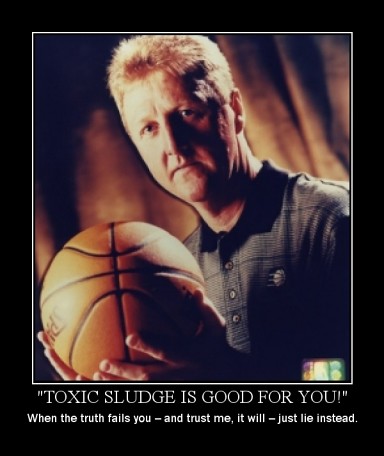
I know what you're thinking, but the answer is no; the Pacers didn't manage to trade Jermaine O'Neal. The Nets didn't want him. And this isn't about how they signed Kareem Rush either, which was less of an upward move and more like a desperate and pathetic cry for help.
Their big move was an entirely different kind of desperate act. It turns out that the Pacers have hired two public relations and advertising firms. Why? Because the team sucks and their fans -- which now number somewhere in the high ones -- all hate them.
I guess that since Larry Bird can't halt his team's tragic downward spiral, he wants to add a little salt to the steaming bowl of crap soup he's serving the fans. Hey, that's American Spirit in action. I mean, you don't need to spend money or make changes if you can just convince your fanbase that a losing culture can be fun. That philosophy has worked for the Chicago Cubs for decades. Why not the Pacers?
I can't see it working, though. It's going to take more than a little extra PR to make the fans forget the brawls, suspensions, injuries, bad trades, strip club shootings, bar fights, and mascot assaults that have plagued the franchise for the past few years. But that doesn't mean there's no hope. Which is why I bring you...
The Basketbawful Public Relations Plan
Step 1: Create an identical clone or robot duplicate of Reggie Miller, then send him to destroy Kobe Bryant in a "Godzilla versus Mothra"-style battle. If Robo-Reggie wins, then everyone will love the Pacers again. If he doesn't, we're all screwed anyway.
Step 2: Give everyone in Indianapolis free tickets to one of Rik Smits' motocross races. Watching a 7'4" giant who couldn't rebound try to ride those little mopeds will make people laugh and bring joy to small children.
Step 3: Create a Pacers Greatest Games DVD set so the fans can relive happier times, like when the Pacers would lose in the NBA Finals or Eastern Conference Finals instead of not making the playoffs or getting knocked out in the first round. Wait. They did that already. And it was just a handful of Pacers/Knicks games with no special features. A true "must not" buy.
Step 4: Use the time machine we invented to save the NBA Finals to go back to 2002 and convince the Pacers not to trade for Ron Artest. If that fails, then assassinate Artest while he's on the toilet or something. Have you ever noticed that nobody ever thinks of that when they travel through time to change the past? I mean, couldn't the Terminator have killed Sarah Connor while she was in grade school? Or Bill and Ted could have used their time-travelling phone booth to gather stock tips from the future...you don't have to do history reports when you're rich. I'm just sayin'.
Step 5: Send out the Pacemates to provide "pleasurable company" to every male Pacers fan in the midwest, particularly if said fan lives in Chicago and is named "Basketbawful." I have to warn you that this one is pretty unlikely, but you can still request a Pacemates appearance at your home, school, or bar mitzvah. Wait a minute. On second thought, scratch this plan altogether. The Pacemates might be the ugliest dancers in the NBA. Seriously.
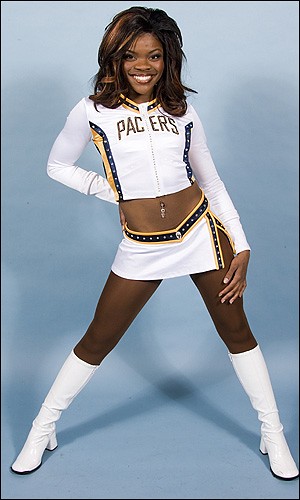
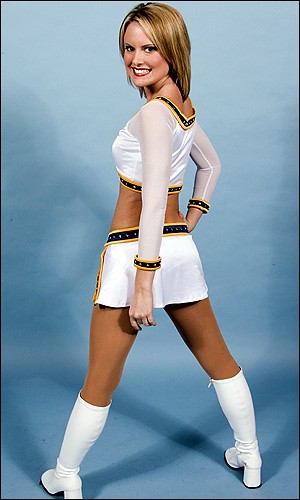
Labels: Indiana Pacers, Jermaine O'Neal, Larry Bird, lies, public relations
Usage example: Dwyane Wade is the current king of circus shots, following in the footsteps of former circus shooting legends like Michael Jordan, Dominque Wilkins, and whoever else you want to name.
Word Trivia: I'm pretty sure that basketball players have been attempting circus shots since about five minutes after Dr. James Naismith first nailed a peach basket to the back of a dinosaur and told his gym students to start throwing rocks at it. However, the circus shot is more prevalent today than ever. This is because, although most circus shots are wildly off the mark, actually hitting one is a guaranteed way to be immortalized on SportsCenter highlights and by a flurry of video clips on YouTube. For instance:
The most famous circus shot ever: Michael Jordan did more to popularize the circus shot than any other player in NBA history. Most people remember the mid-90s version of Michael Jordan, when he drove to the cup selectively and relied mostly on his fallaway jumper. But the mid-80s to early-90s Jordan was in a constant state of leaping, hooking, scooping, dipping, and reversing. In fact, Jordan is the author of the most famous circus shot of all time. It happened in Game 2 of the 1991 Finals against the Los Angeles Lakers and, ironically, it was also the most needless circus shot of all time. Jordan took the ball up with his right hand as if to dunk or lay it in, then inexplicably switched it to his left hand for a more media-friendly attempt. There was absolutely no need whatsoever to do this, however, since he wasn't fouled on the shot and, indeed, there wasn't a defender in sight. This highlight is shown repeatedly throughout the NBA season and endlessly during the playoffs, even though most experts and coaches would agree that taking an easy shot and making it more difficult so you can look cool while doing it is a bad idea, especially in the Finals.
The circus shot king: In many cases, a circus shot is attempted after an offensive player feels contact from his defender on a drive to the basket. This is done, obviously, in the hope of drawing a foul. More often than not, the circus shot is accompanied by a deep grunt or a cry of mock pain (otherwise known as a verbal flop) as a means of selling the foul. Nobody does this better than Dwyane Wade, who is the reigning king of circus shots. Seriously, go to YouTube and do a search for "circus shot." About 97 percent of the results are clips of Wade hitting one ridiculous flinger after another. You have to hand it to Wade, though; in an era where other 2-guards like Ray Allen and Gilbert Arenas are jacking up seven or eight threes a game, last year he shot a "career-high" 0.4 per game. He'd rather take it to the hoop, which is probably why he shot a league-leading 10.5 freethrow attempts a game last season. If they kept stats on circus shot attempts, he probably would have lead the league in that category too.
Labels: Word of the Day
Usage example: Finally free of Grant Hill's ginormous Koncak, the Orlando Magic wasted no time in agreeing to a "bigger and better" Koncak with Rashard Lewis.
Word History: In 1989, the Atlanta Hawks signed Jon Koncak -- a bench player averaging about 5 points and 6 rebounds per game -- to a 6-year, $13 million contract. And yeah, I know that $13 million over six years isn't a lot of money these days, but in 1989 dollars, Koncak was worth more than Larry Bird, Magic Johnson, and Michael Jordan. Seriously.
The Koncak signing succeeded in financially crippling the Hawks for, well, six years, which made it impossible for the team to improve through the acquisition of quality free agents. It is't farfetched to say that much of the misfortune Dominique Wilkins has suffered -- the playoff disappointments, the trade to the Clippers, getting left of the NBA's 50 Greatest Players list, the Hall of Fame snub -- can be attributed to Koncak's Koncak.
Many NBA historians have identified the Koncak as the exact moment teams starting going batshit crazy and signing slightly above-average players for ridiculous sums of money. Examples of other famous Koncaks include Travis Knight's 7-year, $22 million deal with Boston, Brian Cardinal's 6-year, $37 million contract with the Grizzlies, Kenyon Martin's 7-year, $91 million contract with the Nuggets, Howard Eisley's 7-year, $41 million deal with the Knicks, and now Rashard Lewis' 6-year, $110 million contract with the Magic.
The Fans Speak: A few extra tidbits from alert readers. First, I omitted this because I was tired of typing the word "contract," but reader jaz pointed out that Koncak was nicknamed "John Contract" because of his insane deal with the Hawks. An anonymous poster reminded me that part of the reason the Hawks went all-out to resign Koncak was because their bitter rivals, the Detroit Pistons, were also trying to acquire his useless services (I think they were just trying to trick the Hawks into handicapping themselves to resign the big stiff...a strategy that worked to sinister perfection). Max corrected me on Howard Eisley's contract: the Knicks didn't give him the original contract (the Jazz made that terrible mistake), they merely traded for it (but, uh, which is worse?). Finally, Evan from Nerditry.com criticized me (justifiably) for neglecting to mention Jim McIlvane's 5-year, $35 million contract with the Seattle Supersonics, a deal that some people think ruined Shawn Kemp's career.
Breastastic Extra: Since I couldn't find any decent pictures of Koncak, here's one of Denisse, a member of the Hawk's A-Town Dancers. No need to thank me. But you can if you want.
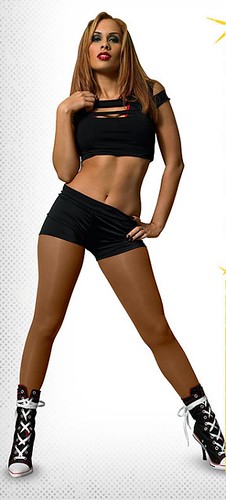
Labels: Atlanta Hawks, bad contracts, Jon Koncak, Rashard Lewis
Labels: Cable Guy, Movies, pickup basketball
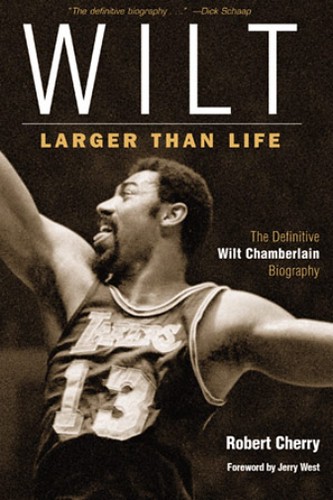
If Kobe Bryant is the most polarizing figure of the new century, then Wilt Chamberlain was easily the most polarizing character of the last one. Depending on whom you talk to or what you read, Wilt was either a selfish loser or the best basketball player of all time. Some people claim he was self-centered, self-indulgent, self-aggrandizing, and any other "self" you can think of. Others believe that he was a gentle, caring, philanthropic soul whose frequent trips down the Ego Superhighway were just amusing examples of "Wilt being Wilt."
So -- evil or good, hero or villain -- which was the "true" Wilt? Honestly, I think he was all of those things. Indisputably great and monumentally self-absorbed, Wilt wanted not a little, but a lot...of everything: To win and to break records, to be The Man without having to take responsibility for tough losses, to love and be loved without the burden of committment. He was a walking, talking, high-scoring paradox.
In some ways, Wilt was almost unknowable. He was shy, secretive, and tended to compartmentalize the various and sundry aspects of his life. But I think that knowing and understanding Wilt Chamberlain -- or, at least, trying to -- is important. He's one of those rare figures that helped define, or redefine, the game of basketball. The NBA created the goaltending rule because of him. They widened the key in part because of Wilt's dominance under the basket. The rule that you can't cross the line on a freethrow until the ball hits the rim was instituted because the league was afraid Wilt would just try to dunk his foul shots (which he was fully capable of doing).
I've read countless books about Wilt, from his autobiographies to novels like The Rivalry: Bill Russell, Wilt Chamberlain, and the Golden Age of Basketball. There are many subtle layers to the man, and you really need to take from multiple sources if you want to get a broad sense of who he was (as well as who he wanted you to think he was). One of the more recent sources is among the best: Wilt: Larger Than Life.
If you're looking for in-depth descriptions of his various in-game accomplishments, then this book isn't for you. Many of his basketball feats are merely summarized and some have been omitted altogether (although, to be fair, Wilt's records would fill an entire book on their own). The author, Robert Cherry, clearly was much more interested in painting a portrait of Wilt the human being than Wilt the basketball superstar. The book fills in a lot of the gaps regarding where Wilt came from and what he was doing with himself when he wasn't dunking on people. There are countless interviews and first-hand accounts of his life, and not only from former players, rivals, and coaches. There are also a great many quotes from the people who knew him in his every day life: lawyers, agents, doctors, family, friends, his lovers, people who hung out and played vollyball with him on the beach, and some of the fortunate many who met him only once for the briefest of moments.
All in all, the book shows Wilt as a person who just wanted to live his life and be happy. He just happened to be over seven feet tall, filthy rich, and incredibly famous. If all you ever knew of Wilt was what he did as a basketball player, you might be interested to discover that he donated time and money to various womens' athletic teams. You might even be touched by the story of how he befriended former teammate Paul Arizin's granddaughter, who was dying of a terminal illness. And you might be surprised at how difficult and lonely the last few months of his life were.
The only criticism I have is that Cherry was, at times, a little too generous to Wilt, tending to gloss over his less appealing character traits while slightly over-emphasizing the better ones. There also were times it seemed as though he was trying to make excuses for Wilt (particularly when discussing how Wilt took only two shots during the second half of Game 7 of the 1968 Eastern Conference Finals). I can forgive these faults, however, because there have been many, many things written that highlight Wilt's dark side. This book was a refreshing change, and an enlightening look at one of the most important men to ever put a ball through a hoop.
Labels: biographies, book reviews, Wilt Chamberlain
Since nobody got hurt, I don't feel too bad about commenting on the irony of the situation, since Walker robbed the Miami Heat of over $7 million last season, and he's going to steal another $40 million from them over the next four years. It's also ironic that the bandits robbed him at gunpoint, since Walker himself is a shooter with little (or no) conscience*.
Strangely enough, this isn't the first time Walker was a victim of armed robbery in his hometown. In July 2000, he and Nazr Mohammed (and three other non-famous people) were robbed at gunpoint outside a restaurant. That time the thieves got away with cash and a $55,000 watch.
*Despite being a career 32 percent three-point shooter, Walker currently ranks sixth all-time in three-point attempts (4,076), trailing only Dale Ellis (4,266), Nick Van Exel (4,278), Tim Hardaway (4,345), Ray Allen (4,839), and Reggie Miller (6,486). Assuming Walker keeps firing away at his current pace -- he tossed up over 300 three-point bombs last season despite hitting only 27 percent of them -- he'll pass Ellis, Van Exel, and Hardaway this season to move into the third spot. Crazy. Reminds me of one of my favorite quotes ever: When asked by a reporter why he attempted so many threes, Walker responded, "Because there are no fours." I never get tired of repeating that.

Update: How could I report on a member of the Miami Heat getting victimized by crime without a gratuitous mention of Shaq's status as a reserve police officer (with both the L.A. Port and Miami Beach Police Departments) and an honorary U.S. Deputy Marshal? That's what you might call irresponsible journalism. Fortunately, reader padraig saved me with the following comment: "I'm sure Reserve Officer O'Neal is in hot pursuit of the ne'er-do-wells, unless he's too busy with his anti-child obesity campaign. Do you think Shaq was the first person Antoine called after the fact? I like to think so."
You read it here first, evildoers. I suggest you turn yourselves in immediately, or face the threat of capture (and possible body cavity search) by Officer "I could kill your thieving ass with one clubbing blow" Shaq.
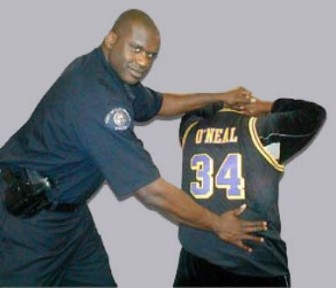
Labels: Antoine Walker, Miami Heat, robbery, three-point shooting
I wonder -- if the outcome of the game had been different, would Magic still look like a more muscular Bill Russell? And would he still have arms that look like they belong on Optimus Prime?
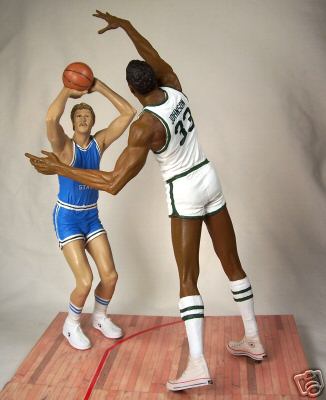
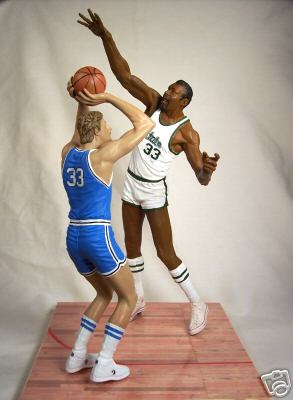
Labels: eBay, Larry Bird, Magic Johnson
The downsides: The action figure is dressed in a Houston Rockets uniform instead of the classic Philly or Phoenix uniforms that Sir Charles wore during his better years. Oddly enough, it's not as fat as the Houston-era Barkley. In fact, it's strangely muscular, has a neck like a giraffe, and now that I think about it, the figure looks more like Roadblock from G.I. Joe than Charles Barkley. So unless your goal is to defeat the forces of COBRA, you might be a little disappointed.
The upsides: You can relive all those classic Barkley moments from his time with the Houston Rockets, like the first-round playoff exits, the time Scottie Pippen complained about his "fat butt," and of course the career-ending quadriceps tendon injury. And since the uniform is removable, you can undress him and -- assuming you have a grandfather figure of a similar size -- recreate the night of passion that followed his All-Star Game makeout session with Dick Bavetta.
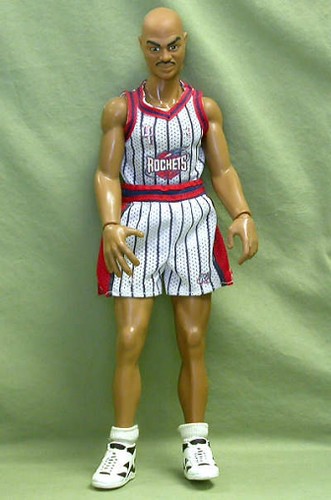
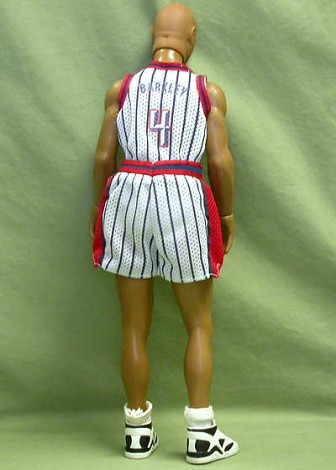
Labels: action figures, Charles Barkley, eBay

I know it's hard to believe today, but before he became a limping human interest story, Grant Hill was one of the best basketball players in the world. He was a two-time NCAA champion (at Duke), NBA co-rookie of the year (with Jason Kidd), an Olympic gold medallist (on Dream Team II), a perennial All-Star (for the Detroit Pistons), and a charter member of the "Next Jordan" Club (alongside Harold Minor, Penny Hardaway, Jerry Stackhouse, and whoever else you want to name).
In August of 2000, Hill’s hard work, dedication, and all-around good guyness was rewarded in the form of a 7-year, $93 million contract courtesy of the Orlando Magic. There he would be teamed with up-and-coming superstar Tracy McGrady, and everybody anticipated the Magic becoming a league powerhouse almost overnight.
But as we all know, that didn’t happen. Thanks to a wide variety of debilitating ankle injuries, Hill played in only 200 games (and missed 374) over his seven years with the Magic. The bulk of those games came in the last three years; he played in only 47 games (out of 328) during his first four seasons in Orlando (otherwise known as the "Tracy McGrady is on his own" Era).
The injuries were grueling, and the surgeries were even moreso. In fact, after one surgery in March of 2003, he developed a staph infection and nearly died. As low points go, "almost dead" ranks just slightly ahead of "actually dead."
Hill made a comeback of sorts over the last three years, playing 67 games in 2004-05 (and averaging a surprising 19.7 PPG) and 65 games last season (averaging a solid 14.4 PPG). There were plenty of teary-eyed tributes and inspirational stories about how he bravely fought through terrible adversity to play the game he loves. As moving as those featurettes usually were, it probably should have been pointed out that he wasn't exactly saving kittens from a burning building, or helping old ladies across the street. But whatever.
Despite all the inspiration, I'm sure the Magic organization was glad that Hill's behemoth contract expired this summer. However, I'm also sure they felt as though they deserved first dibs on his continued services, and on the cheap. After all, hadn't they been patient and diligent in his care? They never tried to rush him back, or force him to play through injuries. As far as I'm aware, they never tried to buy him out or ask him to restructure his contract to ease their salary cap burdens (which were significant). Sure, they appealed to the league for injury exceptions, but by all accounts they treated Hill as well as any organization would have, under the circumstances (which were grim).
Hill didn't give the Magic a chance, though. Instead, he immediately bolted for the Phoenix Suns in what we must assume is one last, desperate gamble for a championship. On the one hand, it's hard to begrudge him that opportunity after all he's suffered through. But on the other hand, Hill really should have rewarded some of the loyalty the Magic have shown him over the last seven years. What happened to Mr. Good Guy? I mean, it's hard to argue that he left Detroit for the money back in 2000, and it's even harder to argue that he's leaving the Magic for a shot at glory. You expect that kind of behavior from most NBA players, but Hill was supposed to be above that sort of thing, a character guy, a Sportsmanship Award winner.
Well, the Magic fans are pissed. Just read some of those comments. I haven't seen a fanbase this bitter and potentially dangerous since, well, since the Celtics "lost" the NBA draft. The sense of betrayal is so strong that many of the fans are openly wishing for Hill to break his ankles (among other things). Most of them think he robbed the Magic and gave very little in return, and it's hard to blame them for feeling that way. I mean, you'll notice that Hill never offered to alter his contract in the team's favor, or pull a Derek Fisher and just set them free of it. No, he expected every dime of that $93 million. And then, as soon as he got the chance, he split.
It's a shame. I always had a lot of respect for Grant Hill. And while I understand that the NBA is, unfortunately, an "every man for himself" business, I frankly still feel that he owed the Magic a little better than that.
Labels: Grant Hill, huge contracts, injuries, Orlando Magic
Labels: Dallas Mavericks, Dirk Nowitzki, tributes
Usage example: Notching a triple-double is something you tell your family about; notching a one trillion is something you tell no one about.
Word History: The term was invented by Scott Hastings, who managed to hang around for 12 seasons as a career backup/role player/scrub. Near as I've been able to determine, he created the trillion in 1990, as evidenced by this reference in the Sports Illustrated Vault: "Scott Hastings, little-used Piston forward, who claims to lead the NBA in a category that he calls the 'trillion': 'That's when the box score reads one minute played followed by 0-0, 0-0, 0-0, 0 0 0.'" (Props to Hastings, not only for the uncommon self-awareness, but also for inventing a statistic to quantify his suckitude.)
The term was also explained in a 1999 Sports Illustrated article called Garbage Time. It says: "Avoid the dread 'trillion.' In other words, if for some reason you can't get off a shot, do something. In garbage-time lingo, trillion is the line in the box score a player gets when his minutes-played stat is followed by zeros in the nine other categories. 'A trillion means you played, but you didn't do anything,' says Vancouver Grizzlies assistant Lionel Hollins, who was an NBA guard for 10 seasons. 'No shots attempted or made, no assists, no rebounds, no fouls, nothing.' If he still has a trillion in the final seconds, the experienced garbage-time player will commit misdemeanor assault to break up his zeros with a '1' in the personal foul column." For the record, Henry Abbott -- who informed me about this article, remembers hearing references to the trillion back in the 80s.
It was further expounded on in 2006 in, of all things, an NBA media guide. No, really. "Some years back, ex-player Scott Hastings devised the Trillion Club. To become a member you must play in an NBA game (no minimum time) and do absolutely nothing since 15 zeros follow the minute column. (A commitee voted to allow a player to join the club if he only had a personal foul.) Ryan Bowen led in 2005-06 (with 19). The 2004-05 winner was Anthony Carter with a record 23. The 2003-04 winner was Darvin Ham with 10. The 2002-03 winner was John Salmons with 10. The 2001-02 winner was Mark Pope with 9; in 2000-01, Travis Knight had 11. In 1999-2000 Doug Overton and Bruce Bowen tied for first with 9. In 1998-99 David Wingate did it 8 times to beat out Brian Evans with 5. In the 1997-98 season DeJuan Wheat of Minnesota led with 11; in 1996-97 Jud Buechler was the runaway winner with 15 games. Lou Roe led in 1995-96 with 12, Doug Lee in 1994-95 with 7."
The term was also used in this article written by Doug Smith for the January 26, 2007 edition of the Toronto Star. Said Smith: "When an end-of-the-bench guy gets in a blowout for a minute, and doesn't record a shot, rebound, assist or point, his boxscore line is known as 'one trillion,' a one followed by nine zeroes." Too bad for Smith (and Hastings before him, I guess) that a trillion actually has 12 zeroes. Don't be too hard on him, though. After all, he is a Canadian. Can you name one famous mathematician from Canada? Exactly.
One problem with the trillion is that every box score is different. For instance, an ESPN.com box score would show 15 zeroes for a one trillion, while a Yahoo Sports box score would show 14. But why get bogged down by details? Webster's New World Dictionary provides an alternate definition of "trillion" that reads "an indefinite but very large number: a hyperbolic use." So perhaps we can agree that the term is simply a way of describing a player's complete and utter statistical insignificance.
Word Examples: Check out this December 29, 2006 box score for the Milwaukee Bucks. Not only did two different players "achieve" a one trillion (Chris McCray and David Noel), two other players almost did it too (Ersan Ilyasova and Damir Markota).
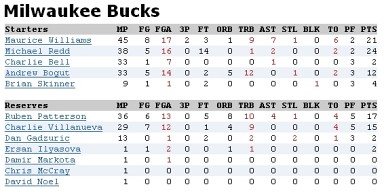
Now dig this January 20, 2007 box score for the Chicago Bulls. Chris Duhon played 10 full minutes without registering a single statistic: No points, rebounds, assists, nothing. It was a seemingly unprecedented ten trillion. I mean, he didn't even put up a shot. On the bright side, he didn't commit any fouls or turnovers either. That's something, I guess. But not really.
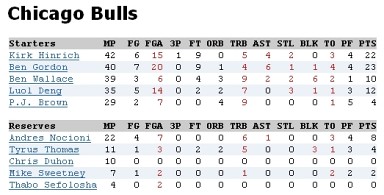
Update: Late breaking news, courtesy of reader Matt. The self-proclaimed "best shooter in the world" Damon Jones had a 12 trillion in Game 1 of the NBA Finals. Congratulations, Damon! You really suck! Oh, and Eric Snow had a one trillion in the same game. Is it any wonder the Cavs got swept?
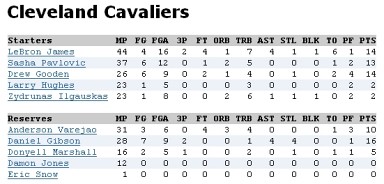
Labels: Word of the Day
Note: The sound isn't very good, so you might need to turn up the volume.
Labels: Boston Celtics, commercials, Larry Bird
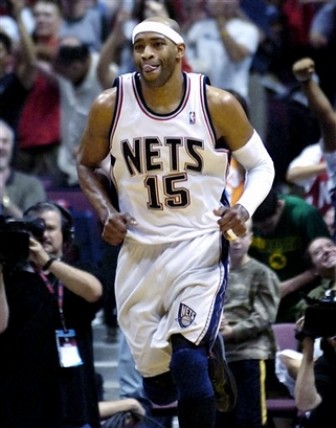
So it looks like Vince Carter has conned the New Jersey (or maybe-soon-to-be-Brooklyn) Nets into breaking the bank and signing him to a 4-year, $61.8 million contract.
If $15+ million a year sounds like a lot money to dole out for a 30-year-old swingman who has a history of tanking on his own teams, you're probably right. But in a sense, the Nets are justified in their decision to resign Carter even though the deal is going to send them soaring wildly over the salary cap. See, Vince very quietly put together a career year last season.
Seriously. Most of his stats went up every-so-slightly. Points, rebounds, and assists were all up. In fact, he posted career-highs in rebounds and assists. It was only the second time in his career -- and the first time since the 1999-2000 season -- that he played in all 82 games. He matched his career high in minutes played. He attempted more shots than he had since the 2000-01 season. He had his second-best-ever year in freethrow attempts, and set a career-high in three-point shot attempts. Finally, he had his third-best field goal percentage year, and his best overall shooting season since 2002-03.
Of all these numbers, the games, minutes played, free-throw attempts, and rebounding numbers are all the most telling. Playing through all the little nicks and scrapes of the NBA season, crashing the boards, taking it strong to the hoop, those are signs of increased effort. Effort from a player, it should be noted, whose heart and desire has been regularly -- and justifiably -- questioned on and off over the years.
So is it just an amazing coincidence that this is the best overall effort Vince has put forth since, well, the last time he was eligible for a new contract (after the 2000-01 season)? Suuuuure, it is. This last season was a textbook example of the Contract Year Phenomenon in action. He was playing for the money, plain and simple. I promise you that most of his numbers are going to drop next season, particularly games played, rebounds, freethrow attempts, and field goal percentage…because when those numbers drop, it's usually a telltale sign that a player has lost focus (assuming he's not injured).
It's also worth noting that, despite Carter's gunning (or maybe because of it), the Nets didn't do much in the way of winning last season. The team spent most of the season below .500 and didn't claw there way there until the final day of a regular season that saw them go 41-41. Mind you, this happened in the horrific Eastern Conference, where it has been proven you can make it to the NBA Finals with one fantastic player and a bunch of scrubs. The Nets had three (or maybe 2.5) fantastic players and spent months spinning their wheels. That's significant, I think. So unless I'm way wrong here, and that's medically impossible, the Nets are going to regret offering up this contract in a couple years.
Labels: Contract Year Phenomenon, New Jersey Nets, Vince Carter
Greg Oden: Oden will be a rebounding and shot-swatting machine, but folks expecting Olajuwon 2.0 should be realistic. Oden will get about 5 dunks a night, but his post game is as green as grass. But Blazer fans haven't been this excited since Darius Miles missed the entire '06-'07 season. Blazers expect: Patrick Ewing, mixed with Tim Duncan and David Robinson, and a splash of Bill Russell. Statbuster expects: A taller Dwight Howard.
Kevin Durant: With Ray Allen out of the picture, Durant will be the first option on offense right away. And that's a good thing. He's that rare player that has size and can score from anywhere on the floor. Right now he's a bit of a tweener on the defensive end, but Seattle as a whole is so lousy on D, no one will notice. Sorry Rashard, your team got better without you. Sonics expect: Rookie of the Year. Statbuster expects: If he punches a fellow Sonic, the Tom Chambers comparison will be complete.
Al Horford: My guess is that either the Hawks plan to use Al Horford as an undersized center, or they have already given up on their last two lottery picks, Marvin and Shelden Williams (ages 21 and 23, both PFs). Either way, when Anthony Johnson is logging 30 minutes a night in January, they'll be wondering if supplanting the Williams kids and Zaza Pachulia was the real need. Hawks expect: Horace Grant. Statbuster expects: Another decent frontcourt player, just like the five they already have. Oh, and 50 losses.
Mike Conley: Unlike the Hawks, the Grizzlies were in desperate need of a PG (sorry, Chucky Atkins fans) and drafted the best one available. Conley should get starter's minutes right away, and keeping Pau Gasol captive last season will end up being a good idea. A core of Pau, Conley, Rudy Gay and Mike Miller stands a chance of being somewhat respectable. Grizzlies expect: TJ Ford. Statbuster expects: The Grizzlies to never tank again.
Jeff Green: Seattle was eager to deem Kevin Durant and Jeff Green the "new era" for the organization. That statement's about half right. Green has zero strength and isn't much of a rebounder, so him beating out Nick Collison or Chris Wilcox isn't likely. And that Durant fellow won't be battling anyone for minutes. Sonics expect: Scottie Pippen. Statbuster expects: A bad Lamar Odom impersonation for 10-15 minutes a game.
Yi Jianlian: Even three years after people began callin Yi "the next big thing", the guy's still a big question mark. Is he the next Yao Ming? What position will he play? Is he 20 years old or 30? Will they have to trade him? Or will he visit the Panda Express on Wisconsin Avenue and shake his head in pity? The Bucks will need him to play the 3 alongside Charlie Villanueva, but he may not have the inside game to use his size advantage. Bucks expect: Toni Kukoc. Statbuster expects: Yi to be completely sick of Wal-Marts, Pabst Blue Ribbon and fried cheese curds by January.
Corey Brewer: I'm not sure what Brewer's specialty is. He only mustered 13 ppg his senior year, and doesn't have NBA three-point range (33% his senior year). All this while posting 2.5 turnovers a night. In comparison, Nick Young (SG taken by the Wizards at 16th) had 2.4 turns a night, but scored nearly 18 a game. Scouts say he's an outstanding defender, but don't the Wolves already have Trenton Hassell? Timberwolves expect: An All-Defensive Teamer. Statbuster expects: Randy Foye and Ricky Davis to have plenty of job security.
Brandan Wright: Golden State turned the Bay area on its ass when they dealt fan favorite Jason Richardson for Wright on draft night. But, honestly, Wright is a steal at the #8 pick (some mock drafts had him as high as 3rd). He has a great touch around the basket and is an outstanding athlete, and is a perfect fit for Don Nelson's coked-up offense. You'll might see a frontcourt rotation of Harrington, Biedrins and Brandan Wright on opening night. Warriors Expect: Chris Bosh Statbuster Expects: To see even less of Adonal Foyle and Patrick O'Bryant next season.
Joakim Noah: The Man They Call Basketbawful wasn't a happy camper when the Bulls selected The Joker with the #9 pick. And I'm not convinced Noah will be in a Bulls uniform come opening night. Assuming he doesn't get dealt, old school coaches like Scott Skiles are notoriously hard on rookies, so Noah will enjoy having front row seats to all the Bulls games next season. Bulls Expect: Tyson Chandler..wait, didn't they already have this guy? Statbuster Expects: More moments like Noah Dance.
Spencer Hawes: Scouts feel Hawes is the most talented low post scorer in the draft. This will be overshadowed by a softness that makes Brad Miller look like Rick Mahorn. Kings Expect: Kevin Duckworth. Statbuster Expects: Hawes may literally be eaten alive next season.
Also worth mentioning:
Tyronn Lue isn't selling his house: The Hawks passed on Mike Conley with the 3rd pick, then later drafted PG Acie Law at #11. ESPN says he's a bit slow and is a so-so jump shooter. That sounds a lot like Mateen Cleaves to me. And we know how that turned out.
Knick Happens: We already touched on New York complimenting their non-defending big man with another non-defending big man. But what did Portland get out of peddling Zach Randolph, their 23-10 guy? Steve Francis isn't exactly a lock to win the starting PG spot from Jarrett Jack. His knees are shot and will likely try to earn more minutes by pouting and being injured. And Channing Frye literally forgot how to play basketball. OK, he was on a bad ankle, but its mind-boggling how far his stock has fallen in eight months.
The Greg Oden Consolation Prize: Celtics fans should think of Ray Allen as the toaster oven and "Price is Right" board game Bob Barker gives you when you lose at Plinko. Honestly, if Celtics lost out on the Oden/Durant Sweepstakes and Jeff Green (the guy the Celts took with the #5 pick) didn't produce right away and they were on pace for another 50 loss season, Beantown would kill somebody. That somebody would be Jeff Green. So by trading him, they did him a huge favor. The Celts wanted an All-Star right now (and managed to deal Wounded Wally in the process), but they should have targeted someone younger and coming off fewer off-season ankle surgeries.
Sleeper of the Draft: With untalented stiffs like Kendrick Perkins and Brian Scalabrine to contend with, a spot in the rotation is there for Glen Davis' taking. He appears to be a throw-in in the Ray Allen trade, but if Davis shows up in November ready to play (i.e. under 300 pounds and no Little Debbies in sight) he has the size and low post moves to make some noise. Attending Celtics games may be slightly less painful this year.
Labels: NBA Draft
February 2005
October 2005
November 2005
December 2005
January 2006
February 2006
March 2006
April 2006
May 2006
June 2006
July 2006
August 2006
September 2006
October 2006
November 2006
December 2006
January 2007
February 2007
March 2007
April 2007
May 2007
June 2007
July 2007
August 2007
September 2007
October 2007
November 2007
December 2007
January 2008
February 2008
March 2008
April 2008
May 2008
June 2008
July 2008
August 2008
September 2008
October 2008
November 2008
December 2008
January 2009
February 2009
March 2009
April 2009
May 2009
June 2009
July 2009
August 2009
September 2009
October 2009
November 2009
December 2009
January 2010
February 2010
March 2010
April 2010
May 2010
June 2010
July 2010
August 2010
September 2010
October 2010
November 2010
December 2010
January 2011
February 2011
March 2011
April 2011
May 2011
June 2011
July 2011
August 2011
September 2011
October 2011
November 2011
December 2011
January 2012
February 2012
March 2012
April 2012
May 2012
June 2012
July 2012
August 2012
September 2012
October 2012
November 2012
December 2012
January 2013
February 2013
March 2013
April 2013
May 2013
June 2013
July 2013
August 2013
September 2013
October 2013
November 2013
December 2013
April 2014
May 2014
June 2014
July 2014
August 2014
June 2018
July 2022
